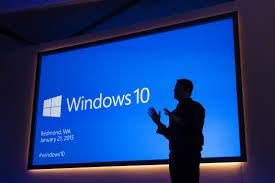
Are you downloading Windows 10 upgrade? or planning to do so in next few hours? then I am totally sorry for spoiling your excitement but I think that you should know some facts that can grade Windows 10 into a spying software.
Along with sleek features, Windows 10 comes with new set of privacy policies that have attracted a lot of criticism with-in 24 hours of its launch.
You should go ahead and read Privacy Policy and Service Agreement yourself in detail to find out the extent of information that you would be sharing with Microsoft.
I am presenting few of the items below:
Data Syncing is by Default Enabled
Your private data and apps (software) settings will be synced with Microsoft servers by default. This data includes your browsing history, websites that are open, apps settings, software setting, WiFi hotspot names and passwords and similar things.
This is very much similar to what Chrome does and it can be disabled by going into Setting menu > Privacy> general > Change privacy option.
Your Device is By Default Tagged with a Unique Advertising ID
With Windows 10, each user on each device is uniquely assigned an advertising ID that can be used to serve you with personalized advertisements by third-party advertisers and ad networks.
You can opt-out of this tagging by going into privacy options.
Cortana Can Collect Any of your Data
Cortana, a Siri like voice assistant that isn’t available in Pakistan as a feature but is bundled with the Windows 10 upgrade, can collect any and every data that you use, including your keystrokes, mic input, searches, data from your calendar, your address book, contacts and relationship, credit card payment information, data from your email, SMS, your call list, music that you listen, what you view or purchase, browser history and what not.
Microsoft says that its necessary for Cortana to collect all this data in order to work with optimum results. However, there is a lot of data that you are allowing to send back to Microsoft servers and we think you should be aware of this fact.
Microsoft can Collect Any Personal Data of Yours!
In addition to what’s mentioned above, when you download Windows 10 and sign the agreement, you are actually authorizing Microsoft to collect your following information:
- Your Identity: First and last name, email address, postal address, phone number, and other similar contact data
- Passwords: Passwords, password hints, and similar security information used for authentication and account access
- Demographics: Data about you such as your age, gender, country and preferred language
- Interests and Habits: Data about your interests and favorites, such as the teams you follow in a sports app, the stocks you track in a finance app, or the favorite cities you add to a weather app.
- Credit Card information: Data necessary to process your payment if you make purchases, such as your payment instrument number (such as a credit card number), and the security code associated with your payment instrument.
- Usage data: Microsoft collects data about how you interact with various services. Such as the features you use, the items you purchase, the web pages you visit, and the search terms you enter.
- Contacts and relationships. We collect data about your contacts and relationships if you use a Microsoft service to manage contacts, or to communicate or interact with other people or organizations.
- Location data. Microsoft collects data about your location, either through GPS or by identifying nearby cell towers and Wi-Fi hotspots.
- Content: Microsoft collects content of your files and communications when necessary to provide you with the services you use. This includes: the content of your documents, photos, music or video you upload to a Microsoft service such as OneDrive. It also includes the content of your communications sent or received using Microsoft services, such as the:
- subject line and body of an email,
- text or other content of an instant message,
- audio and video recording of a video message, and
- audio recording and transcript of a voice message you receive or a text message you dictate.
Your Data Can be Shared
When downloading Windows 10, you are authorizing Microsoft to share any of above mentioned data with any third-party, with or without your consent.
Here’s what the privacy policy says:
We share your personal data with your consent or as necessary to complete any transaction or provide any service you have requested or authorized.
We will access, disclose and preserve personal data, including yourcontent (such as the content of your emails, other private communications or files in private folders), when we have a good faith belief that doing so is necessary to:
- Comply with applicable law
- Protect our customers, for example to prevent spam or attempts to defraud users of the services, or to help prevent the loss of life or serious injury of anyone;
- Operate and maintain the security of our services, including to prevent or stop an attack on our computer systems or networks; or
- Protect the rights or property of Microsoft
Conclusion
Since Windows 10 is a device independent OS, meaning that it will be able to run on PCs, tablets, smartphones and on other capable devices, it collects a lot more data than previous versions. However, accessing private files and emails is pretty serious.
While I know that there’s nothing private on internet, this is a lot of private data that is going to get accessed and probably shared with third parties.
Considering Windows 10 is distributed as a free upgrade, data privacy advocates are likely to get on the roll soon.
Over all I think it may get crucial for many to decide to either upgrade to Windows 10 or not.
Let me know your opinions.



